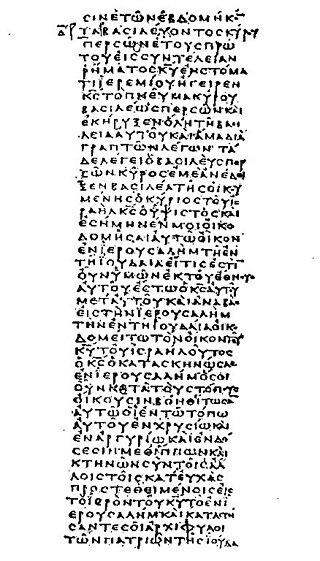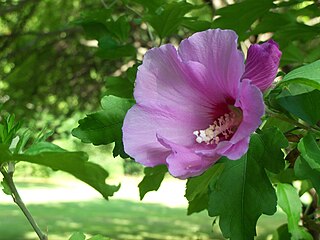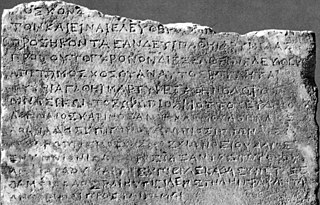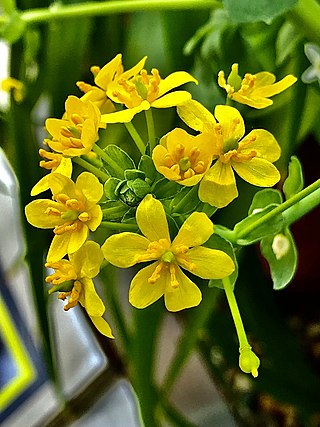The deuterocanonical books, meaning 'of, pertaining to, or constituting a second canon', collectively known as the Deuterocanon (DC), are certain books and passages considered to be canonical books of the Old Testament by the Catholic Church, the Eastern Orthodox Church, the Oriental Orthodox Church, and the Church of the East. In contrast, modern Rabbinic Judaism and Protestants regard the DC as Apocrypha.
The New Testament (NT) is the second division of the Christian biblical canon. It discusses the teachings and person of Jesus, as well as events relating to first-century Christianity. The New Testament's background, the first division of the Christian Bible, is called the Old Testament, which is based primarily upon the Hebrew Bible; together they are regarded as Sacred Scripture by Christians.
The Old Testament (OT) is the first division of the Christian biblical canon, which is based primarily upon the 24 books of the Hebrew Bible, or Tanakh, a collection of ancient religious Hebrew and occasionally Aramaic writings by the Israelites. The second division of Christian Bibles is the New Testament, written in Koine Greek.

The Septuagint, sometimes referred to as the Greek Old Testament or The Translation of the Seventy, and abbreviated as LXX, is the earliest extant Greek translation of the Hebrew Bible from the original Biblical Hebrew. The full Greek title derives from the story recorded in the Letter of Aristeas to Philocrates that "the laws of the Jews" were translated into the Greek language at the request of Ptolemy II Philadelphus by seventy-two Hebrew translators—six from each of the Twelve Tribes of Israel.

The Leviathan is a sea serpent demon noted in theology and mythology. It is referenced in several books of the Hebrew Bible, including Psalms, the Book of Job, the Book of Isaiah, and the pseudepigraphical Book of Enoch. The Leviathan is often an embodiment of chaos, threatening to eat the damned when their lives are over. In the end, it is annihilated. Christian theologians identified Leviathan with the demon of the deadly sin envy. According to Ophite diagrams, the Leviathan encapsulates the space of the material world.

Yeshua was a common alternative form of the name Yehoshua in later books of the Hebrew Bible and among jewish people of the Second Temple period. The name corresponds to the Greek spelling Iesous (Ἰησοῦς), from which, through the Latin IESVS/Iesus, comes the English spelling Jesus.

Rose of Sharon is a biblical expression, though the identity of the plant referred to is unclear and is disputed among biblical scholars. It has become a common name for several species of flowering plants that are valued in different parts of the world. In no case does it refer to actual roses. The name's varied colloquial application has been used as an example of the lack of precision of common names, which can potentially cause confusion. "Rose of Sharon" has become a frequently used catch phrase in poetry and lyrics.

A pseudepigraph is a falsely attributed work, a text whose claimed author is not the true author, or a work whose real author attributed it to a figure of the past. The name of the author to whom the work is falsely attributed is often prefixed with the particle "pseudo-", such as for example "pseudo-Aristotle" or "pseudo-Dionysius": these terms refer to the anonymous authors of works falsely attributed to Aristotle and Dionysius the Areopagite, respectively.
Pseudo-Philo is the name commonly used for the unknown, anonymous author of the Biblical Antiquities. This text is also commonly known today under the Latin title Liber Antiquitatum Biblicarum, a title that is not found in the Latin manuscripts. Although probably originally written in Hebrew, it is preserved today only through a Latin translation found in 18 complete and 3 fragmentary manuscripts that date between the eleventh and fifteenth centuries CE. In addition, material paralleling that in the Biblical Antiquities is also found in the Chronicles of Jerahmeel, a 14th-century Hebrew composition. The Latin text of the Biblical Antiquities circulated alongside Latin translations of the authentic writings of Philo of Alexandria. Scholars have long recognized the pseudonymous character of the text now known as the Biblical Antiquities. Primary in this regard is a vastly differing approach to and use of the Jewish scriptures. For the sake of convenience, scholars continue to follow the lead of Leopold Cohn in calling the unknown author "Pseudo-Philo".
Biblical Aramaic is the form of Aramaic that is used in the books of Daniel and Ezra in the Hebrew Bible. It should not be confused with the Targums – Aramaic paraphrases, explanations and expansions of the Hebrew scriptures.

Balm of Gilead was a rare perfume used medicinally that was mentioned in the Hebrew Bible and named for the region of Gilead, where it was produced. The expression stems from William Tyndale's language in the King James Bible of 1611 and has come to signify a universal cure in figurative speech. The tree or shrub producing the balm is commonly identified as Commiphora gileadensis. However, some botanical scholars have concluded that the actual source was a terebinth tree in the genus Pistacia.

In the Hebrew Bible, Melchizedek was the king of Salem and priest of El Elyon. He is first mentioned in Genesis 14:18–20, where he brings out bread and wine and then blesses Abram, and El Elyon or "the Lord, God Most High". Abram was returning from pursuing the kings who came from the East and gave him a "tenth of everything".

Alcoholic beverages appear in the Hebrew Bible, after Noah planted a vineyard and became inebriated. In the New Testament, Jesus miraculously made copious amounts of wine at the wedding at Cana. Wine is the most common alcoholic beverage mentioned in biblical literature, where it is a source of symbolism, and was an important part of daily life in biblical times. Additionally, the inhabitants of ancient Israel drank beer and wines made from fruits other than grapes, and references to these appear in scripture. However, the alcohol content of ancient alcoholic beverages was significantly lower than modern alcoholic beverages. The low alcohol content was due to the limitations of fermentation and the nonexistence of distillation methods in the ancient world. Rabbinic teachers wrote acceptance criteria on consumability of ancient alcoholic beverages after significant dilution with water, and prohibited undiluted wine.

Amyris is a genus of flowering plants in the citrus family, Rutaceae. The generic name is derived from the Greek word αμυρων, which means "intensely scented" and refers to the strong odor of the resin. Members of the genus are commonly known as torchwoods because of their highly flammable wood.

Stacte and nataph are names used for one component of the Solomon's Temple incense, the Ketoret, specified in the Book of Exodus. Variously translated to the Greek term or to an unspecified "gum resin" or similar, it was to be mixed in equal parts with onycha, galbanum and mixed with pure frankincense and they were to "beat some of it very small" for burning on the altar of the tabernacle.
This is a glossary of terms used in Christianity.

Ioudaios is an Ancient Greek ethnonym used in classical and biblical literature which commonly translates to "Jew" or "Judean".
The golden age of Jewish poetry in Al-Andalus developed in the literary courts of the various taifas. Like its Arabic counterpart, its production diminished in the 12th century under the rule of the Almoravids and Almohads. In the last part of the 10th century, Dunash ben Labrat revolutionized Jewish poetry in Al-Andalus by bringing Arabic meter and monorhyme into Hebrew writing. Jewish poets employed Arabic poetic themes, writing bacchic poetry, garden poetry, and love poetry.

Leontice leontopetalum, commonly known as leontice, lion's foot, lion's turnip, and lion's leaf, is a perennial geophyte having a wide distribution, and growing primarily in semi-desert regions. The name "lion's foot" is derived from the Greek λεοντοπέταλη [= "lioness"] in reference to a fancied resemblance between the shape of the leaves and the pads of a lioness’s paw.










